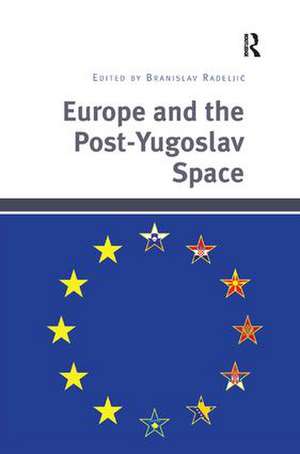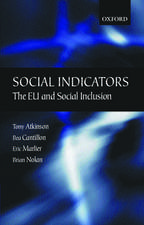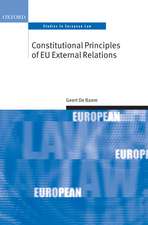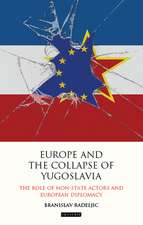Europe and the Post-Yugoslav Space
Editat de Branislav Radeljicen Limba Engleză Hardback – 14 iun 2013
Preț: 1113.91 lei
Preț vechi: 1358.43 lei
-18% Nou
Puncte Express: 1671
Preț estimativ în valută:
213.18€ • 219.92$ • 180.42£
213.18€ • 219.92$ • 180.42£
Carte tipărită la comandă
Livrare economică 05-19 martie
Preluare comenzi: 021 569.72.76
Specificații
ISBN-13: 9781409453901
ISBN-10: 1409453901
Pagini: 244
Dimensiuni: 156 x 234 x 16 mm
Greutate: 0.59 kg
Ediția:New.
Editura: Taylor & Francis
Colecția Routledge
Locul publicării:Oxford, United Kingdom
ISBN-10: 1409453901
Pagini: 244
Dimensiuni: 156 x 234 x 16 mm
Greutate: 0.59 kg
Ediția:New.
Editura: Taylor & Francis
Colecția Routledge
Locul publicării:Oxford, United Kingdom
Recenzii
’This book offers an innovative and valuable approach to the subject of the European Union's engagement with the Western Balkans. Drawing together country-by-country insights from scholars from the region, it provides a very welcome counter-balance to the existing external perspectives on the EU and the post-Yugoslav space.’ James Ker-Lindsay, London School of Economics and Political Science, UK ’This is a timely and useful analysis of the impact of EU policy on processes of democratic consolidation in the Yugoslav successor states. Written by a new generation of scholars from the region, the chapters elucidate both the positive effects of the EU’s involvement with the post-Yugoslav space and the limitations inherent in all externally driven projects of political transformation.’ Jasna Dragovic-Soso, Goldsmiths, University of London, UK
Notă biografică
Branislav Radeljic is Senior Lecturer in International Politics within the School of Law and Social Sciences, University of East London. His main research interests focus on the study of European Union politics and the Western Balkans.
Cuprins
Chapter 1 Europe and the Post-Yugoslav Space, BranislavRadelji?; Chapter 2 Returning to Europe, DamjanMandelc; Chapter 3 Expanded Accession Conditionality, AntonijaPetri?uši?, LjubomirMiki?; Chapter 4 The EU in the Republic of Macedonia, SimonidaKa?arska; Chapter 5 Montenegro and the EU, JelenaDžanki?; Chapter 6 From Deep-Seated Animosity to Principled Disagreement, MarkoStoji?; Chapter 7 Bosnia and Herzegovina in the EU Integration Process, EmirVajzovi?; Chapter 8 Democratization in Kosovo, Leandrit I.Mehmeti; Chapter 9 The Future of the Post-Yugoslav Space, BranislavRadelji?;
Descriere
Charting the path from intervention to integration Europe and the Post-Yugoslav Space examines the role of Europeanization on the development of the countries of the former Yugoslavia. Slovenia, Croatia, Macedonia, Montenegro, Serbia, Bosnia and Herzegovina and Kosovo may have a shared history but their experiences, views and attitudes to European integration vary dramatically. Opinion within each state is often equally as keenly divided as to the benefits of active membership. The debate within each country and their comparative differences in approach provide fascinating case studies on the importance and relevance of the EU and the effectiveness of Europeanization.




















